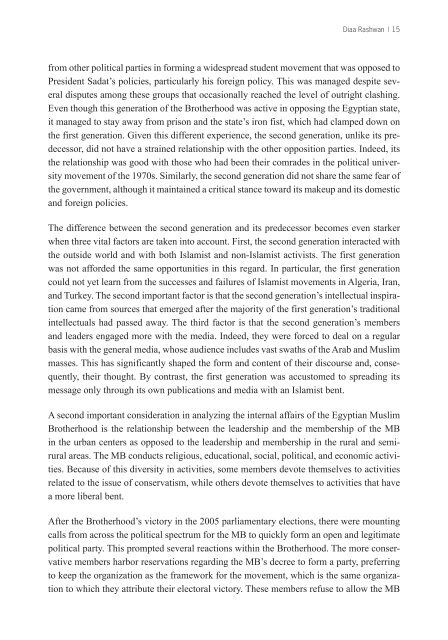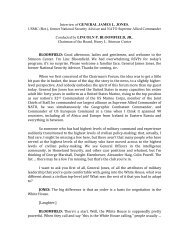Islam and Politics - The Stimson Center
Islam and Politics - The Stimson Center
Islam and Politics - The Stimson Center
Create successful ePaper yourself
Turn your PDF publications into a flip-book with our unique Google optimized e-Paper software.
Diaa Rashwan | 15<br />
from other political parties in forming a widespread student movement that was opposed to<br />
President Sadat’s policies, particularly his foreign policy. This was managed despite several<br />
disputes among these groups that occasionally reached the level of outright clashing.<br />
Even though this generation of the Brotherhood was active in opposing the Egyptian state,<br />
it managed to stay away from prison <strong>and</strong> the state’s iron fist, which had clamped down on<br />
the first generation. Given this different experience, the second generation, unlike its predecessor,<br />
did not have a strained relationship with the other opposition parties. Indeed, its<br />
the relationship was good with those who had been their comrades in the political university<br />
movement of the 1970s. Similarly, the second generation did not share the same fear of<br />
the government, although it maintained a critical stance toward its makeup <strong>and</strong> its domestic<br />
<strong>and</strong> foreign policies.<br />
<strong>The</strong> difference between the second generation <strong>and</strong> its predecessor becomes even starker<br />
when three vital factors are taken into account. First, the second generation interacted with<br />
the outside world <strong>and</strong> with both <strong>Islam</strong>ist <strong>and</strong> non-<strong>Islam</strong>ist activists. <strong>The</strong> first generation<br />
was not afforded the same opportunities in this regard. In particular, the first generation<br />
could not yet learn from the successes <strong>and</strong> failures of <strong>Islam</strong>ist movements in Algeria, Iran,<br />
<strong>and</strong> Turkey. <strong>The</strong> second important factor is that the second generation’s intellectual inspiration<br />
came from sources that emerged after the majority of the first generation’s traditional<br />
intellectuals had passed away. <strong>The</strong> third factor is that the second generation’s members<br />
<strong>and</strong> leaders engaged more with the media. Indeed, they were forced to deal on a regular<br />
basis with the general media, whose audience includes vast swaths of the Arab <strong>and</strong> Muslim<br />
masses. This has significantly shaped the form <strong>and</strong> content of their discourse <strong>and</strong>, consequently,<br />
their thought. By contrast, the first generation was accustomed to spreading its<br />
message only through its own publications <strong>and</strong> media with an <strong>Islam</strong>ist bent.<br />
A second important consideration in analyzing the internal affairs of the Egyptian Muslim<br />
Brotherhood is the relationship between the leadership <strong>and</strong> the membership of the MB<br />
in the urban centers as opposed to the leadership <strong>and</strong> membership in the rural <strong>and</strong> semirural<br />
areas. <strong>The</strong> MB conducts religious, educational, social, political, <strong>and</strong> economic activities.<br />
Because of this diversity in activities, some members devote themselves to activities<br />
related to the issue of conservatism, while others devote themselves to activities that have<br />
a more liberal bent.<br />
After the Brotherhood’s victory in the 2005 parliamentary elections, there were mounting<br />
calls from across the political spectrum for the MB to quickly form an open <strong>and</strong> legitimate<br />
political party. This prompted several reactions within the Brotherhood. <strong>The</strong> more conservative<br />
members harbor reservations regarding the MB’s decree to form a party, preferring<br />
to keep the organization as the framework for the movement, which is the same organization<br />
to which they attribute their electoral victory. <strong>The</strong>se members refuse to allow the MB

















